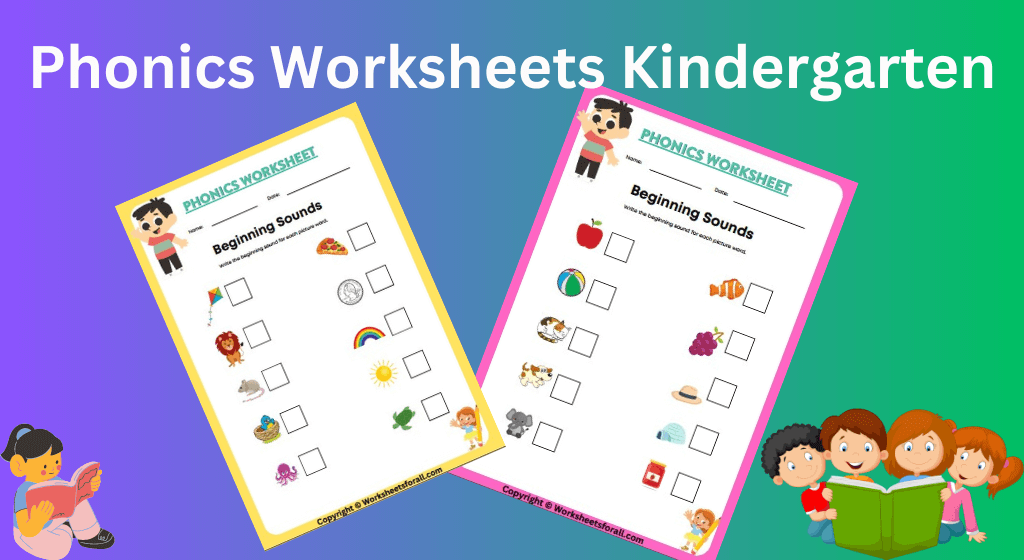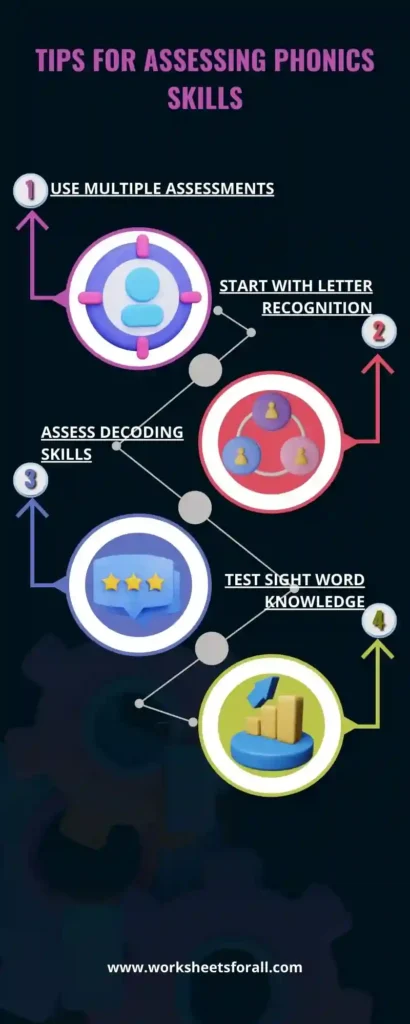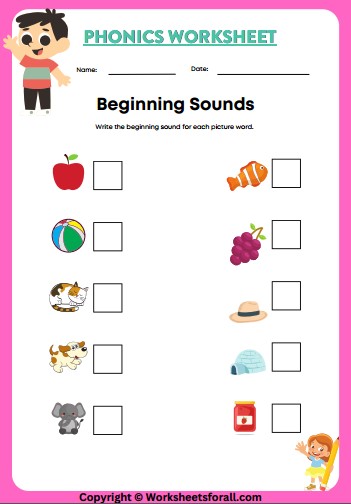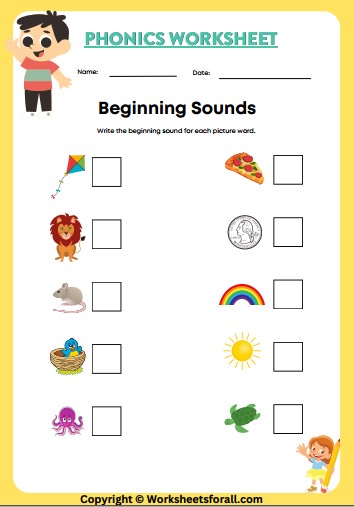Phonics Worksheets Kindergarten: The Best Free Resource For K-children
Updated: March 14, 2023
506

It is a comprehensive collection of phonics worksheets kindergarten for young learners. These worksheets are designed to help children develop their phonemic awareness, phonics skills, and early reading abilities. They are perfect for parents who want to supplement their child’s learning at home or homeschoolers looking for a phonics curriculum. Kindergarten teachers can also use these phonics worksheets for kindergarten pdf as part of their lesson plans.
Free Phonics Worksheets Kindergarten PDF
Phonics Kindergarten Worksheets for Early Readers
Phonics instruction is a critical component of early literacy development, and it can be especially challenging for young readers just starting out. That’s why we’ve put together a collection of kindergarten phonics worksheets that make learning phonics fun and engaging for early readers.
Our phonics worksheets for kindergarten pdf are designed to help children master the basics of phonics, including letter recognition, phoneme blending, word families, and sight words. With interactive exercises and engaging activities, our phonics worksheets help build a strong foundation for future reading success.
One of the biggest advantages of our phonics worksheets for kindergarten pdf is their flexibility. Whether you’re a parent, homeschooling educator, or classroom teacher, our worksheets can be adapted to meet the needs of your child or students. Plus, with our easy-to-follow instructions and answer keys, you can be sure that your child is making progress and mastering key phonics skills.
Our Phonics Made Easy worksheets cover a range of phonics topics, including:
Letter recognition:
Help your child learn to identify letters and their sounds with our letter recognition worksheets. From uppercase and lowercase letters to letter-sound correspondence, our worksheets help children master the basics of phonics.
Phoneme blending:
Once your child has mastered letter recognition, it’s time to start blending sounds together. Our phoneme blending worksheets help children develop their phonological awareness and learn to read simple words.
Word families:
Understanding word families is a key component of phonics instruction. Our word family worksheets help children identify common patterns and develop their decoding skills.
Sight words:
High-frequency words, or sight words, are essential for early reading success. Our sight words worksheets help children recognize and read common words in context.
At Phonics Made Easy, we believe that learning phonics should be fun, engaging, and accessible to all children. With our collection of kindergarten phonics worksheets, you can help your child or students develop the phonics skills they need to become confident, fluent readers.
Interactive Letter Recognition Worksheets for Phonics Practice
Learning letter recognition is a crucial first step in phonics instruction, and it’s essential for developing strong reading skills. That’s why we’ve created a collection of interactive letter recognition worksheets that make learning letters fun and engaging for young children.
Our interactive phonics worksheets for kindergarten pdf use a range of activities to help children master letter recognition. From tracing and matching letters to identifying letter sounds, our worksheets help build a strong foundation for phonics instruction.
One of the biggest advantages of our interactive letter recognition worksheets is their adaptability. Whether you’re a parent, homeschooling educator, or classroom teacher, our worksheets can be customized to meet the needs of your child or students. Plus, with our interactive features, children can actively engage with the material, making learning more enjoyable and effective.
Our Interactive Letter Recognition Worksheets cover a range of letter recognition topics, including:
Uppercase and lowercase letters:
Help your child or students learn to recognize both uppercase and lowercase letters with our worksheets. With activities like letter matching and letter tracing, children can develop their letter recognition skills in a fun and interactive way.
Letter-sound correspondence:
Once children have mastered letter recognition, it’s important to teach them the corresponding sounds. Our worksheets use interactive activities to help children connect letters with their sounds and develop phonological awareness.
Alphabet sequence
Learning the order of the alphabet is an important part of letter recognition. Our worksheets include activities that help children master the alphabet sequence, from identifying missing letters to arranging letters in order.
For phonics worksheets for kindergarten pdf, we believe that learning letter recognition should be engaging and interactive. With our collection of worksheets, you can help your child or students develop the foundational skills they need for future reading success.
Blending Sounds: Fun Phonics Worksheets Kindergarten Kids
Blending sounds is a crucial skill for young children as they learn to read. Our collection of fun phoneme worksheets is designed to help kindergarten kids master this skill in a fun and engaging way.
Our phonics worksheets for kindergarten pdf focus on blending individual sounds to form words, an essential step in learning to read. Children will have the opportunity to practice blending consonant and vowel sounds to create words, developing their phonemic awareness and phonics skills.
One of the unique features of our worksheets is the fun and engaging activities that help children learn. From picture matching to word-building games, our worksheets are designed to make learning phonemes enjoyable and effective.
Our Blending Sounds worksheets cover a range of phoneme topics, including:
Consonant and vowel sounds:
Our vowel worksheets for kindergarten include a range of activities that focus on blending consonant and vowel sounds to create words. Children will learn to recognize and blend sounds like “b-a-t” and “f-i-sh” to form words.
CVC Words Worksheets:
Once children have mastered individual sounds, they can move on to blending them to form CVC words (consonant-vowel-consonant). Our worksheets include a variety of CVC word-building activities to help children develop this skill.
Sight Words Worksheets
Sight words worksheets have those common words that children need to recognize instantly to become fluent readers. Our worksheets include sight word blending activities to help children learn to recognize and blend these important words.
At Blending Sounds, we believe that learning to read should be fun and engaging. With our collection of phoneme worksheets, you can help your child or students develop the foundational skills they need for future reading success.
Word Families Made Simple: Phonics Worksheets Kindergarten
Word families are groups of words that have the same ending sound and similar spelling patterns. Teaching children about word families is a great way to help them develop their phonemic awareness and improve their reading skills. Our Word Families Made Simple worksheets are designed to make learning about word families easy and fun for kindergarten kids.
Our worksheets focus on common word families like “-at,” “-an,” “-op,” and more. Children will have the opportunity to practice reading and writing words within a particular word family, developing their phonics skills as they go.
Our Word Families Made Simple worksheets include a variety of engaging activities that help children learn. From word matching to fill-in-the-blank exercises, our worksheets are designed to keep children interested and excited about learning.
Some of the unique features of our worksheets include:
Picture support:
Our worksheets include pictures to help children understand the meaning of each word. This visual support is especially helpful for young children who are still developing their reading comprehension skills.
Multi-sensory learning:
Our worksheets include a variety of activities that engage multiple senses, including sight, sound, and touch. This multi-sensory approach helps children learn and retain information more effectively.
Progress tracking Phonics Worksheets Kindergarten:
Our worksheets come with progress tracking sheets so that parents and teachers can monitor their child’s or student’s progress and identify areas that need improvement.
At Word Families Made Simple, we believe that learning should be fun and accessible for all children. With our collection of kindergarten phonics worksheets, you can help your child or students develop their reading skills and build a foundation for future academic success.
Sight Words Practice for Emerging Readers: Kindergarten Worksheets
Sight words are high-frequency words that children need to recognize quickly and automatically to become successful readers. These words often do not follow the rules of phonics, so memorizing them is crucial for early readers. Our Sight Words Practice worksheets are designed to help emerging readers master these important words.
Our worksheets include a variety of fun and interactive activities that allow children to practice reading and writing sight words. From word searches to fill-in-the-blank exercises, our worksheets offer a range of activities that cater to different learning styles.
Some of the unique features of our Sight Words Practice worksheets include:
Engaging visuals:
Our worksheets include engaging visuals that help children connect the words to their meanings. This visual support makes it easier for children to memorize the sight words and recognize them in context.
Interactive activities:
Our worksheets include a range of interactive activities, including cut-and-paste exercises and word building activities. These activities help children develop fine motor skills while also learning new sight words.
Gradual progression:
Our worksheets follow a gradual progression, introducing new sight words slowly and systematically. This approach ensures that children build a strong foundation of sight words before moving on to more complex reading skills.
At Sight Words Practice, we are committed to helping emerging readers develop the skills they need to become confident and successful readers. Our collection of kindergarten worksheets is perfect for parents, homeschoolers, and teachers who want to provide their children with the tools they need to succeed in reading.
Engaging Phonics worksheets kindergarten Activities for Little Learners
Phonics is a crucial aspect of early literacy development, as it helps children learn to read and write by teaching them how to decode words. However, teaching phonics can be a challenge, especially with little learners who have short attention spans. That’s why it’s important to incorporate engaging phonics activities into your teaching methods.
Here are some ideas for fun and interactive phonics activities that little learners will love:
- Alphabet scavenger hunt: Hide letters around the classroom or home, and have children find them and say their sounds.
- Phonics hopscotch: Draw a hopscotch grid with letters instead of numbers, and have children say the sound of the letter they land on.
- Phonics bingo: Create bingo cards with letters or words, and have children listen for the sounds and mark them off when they hear them.
- Word building: Provide children with letter tiles and have them build words using the tiles.
- Phonics song and dance: Create a fun song or dance that incorporates phonics sounds and movements.
These activities are not only engaging, but they also help reinforce phonics skills in a fun and memorable way. By making phonics learning interactive and enjoyable, little learners will be more likely to stay focused and retain the information they are learning.
At Phonics Activities for Little Learners, we believe that teaching phonics should be a fun and rewarding experience for both children and teachers. Our resources and activities are designed to engage and excite little learners while also building important literacy skills.
Effective Use of Phonics Worksheets Kindergarten in Homeschool
Phonics worksheets can be a valuable tool in both homeschool and classroom settings. However, it’s important to use them effectively to ensure that they are helping students build their phonics skills and not just busy work.
Here are some tips for effectively using phonics worksheets:
- Use them as a supplement: Phonics worksheets can be a great supplement to other phonics instruction, such as reading books or playing phonics games. They can provide additional practice and reinforcement for the skills being taught.
- Incorporate them into lessons: Integrate phonics worksheets into lessons, using them to teach specific skills or reinforce concepts taught in class.
- Monitor progress: Keep track of student progress by reviewing completed worksheets and providing feedback. This will help you identify areas where students may need additional support.
- Make them engaging: Use colorful graphics, fun fonts, and interesting content to make the worksheets engaging for students. This can help keep them motivated and interested in the material.
- Differentiate instruction: Adjust the difficulty level of the worksheets to match the needs of individual students. This can help ensure that students are challenged but not overwhelmed.
Overall, phonics worksheets can be an effective tool for building phonics skills in both homeschool and classroom settings. By using them thoughtfully and creatively, teachers and homeschool parents can help students develop strong phonics skills that will support their reading and writing abilities.
Tracking Progress: Assessing Skills by Phonics Worksheets Kindergarten
Assessing phonics skills is an important part of supporting the development of early readers. In kindergarten, students are just beginning to learn the building blocks of reading, including letter sounds, sight words, and decoding skills. By tracking their progress, teachers and parents can identify areas of strength and areas where students need additional support.
Here are some tips for assessing phonics skills in kindergarten readers:

- Use multiple assessments: There are many different ways to assess phonics skills, including standardized tests, informal assessments, and observations. Use a variety of methods to get a complete picture of each student’s skills.
- Start with letter recognition: Before students can begin to decode words, they need to be able to recognize letters and their sounds. Start by assessing letter recognition and sounds, and use this information to guide instruction.
- Test sight word knowledge: Sight words are common words that students should be able to recognize without sounding out. Test students’ sight word knowledge to see where they are in their development.
- Assess decoding skills: Decoding skills are the ability to sound out words using phonics skills. Use assessments to see where students are in their ability to decode words.
- Keep track of progress: Record students’ scores and use them to track progress over time. This will help you identify areas where students are improving and areas where they need additional support.
By regularly assessing phonics skills, teachers and parents can ensure that students are on track for reading success. Use a variety of assessments to get a complete picture of each student’s skills, and use this information to guide instruction and support students’ development.
Expert Tips for Phonics Learning by Phonics Worksheets Kindergarten
Learning phonics is a critical foundation for emerging readers, and it’s essential to support children’s phonics learning effectively. Whether you’re a parent, teacher, or homeschool educator, there are several ways you can help your kindergarten child develop strong phonics skills.
One effective way to support phonics learning is to make it fun and engaging. Incorporate games, songs, and interactive activities to keep children interested and motivated. Additionally, provide plenty of opportunities for practice, repetition, and reinforcement of phonics skills.
Another important tip is to ensure that children have a solid understanding of phonemic awareness, which is the ability to identify and manipulate individual sounds in words. This foundational skill is critical for successful phonics learning.
It’s also important to keep track of children’s progress and assess their phonics skills regularly. This can help identify areas that need additional support or attention and inform instructional decisions.
Always consider using a variety of teaching methods and materials to cater to different learning styles and preferences. Some children may learn best through visual aids, while others may benefit from hands-on activities or auditory instruction.
By incorporating these expert tips into your phonics instruction, you can effectively support your kindergarten child’s phonics learning and set them up for reading success.
Building a Strong Foundation: Creating a Comprehensive Phonics Worksheets Kindergarten
A comprehensive phonics curriculum is an essential foundation for kindergarten students to develop strong reading and writing skills. A well-rounded phonics curriculum includes a variety of activities and resources to engage learners and support their development.
To build a strong foundation, teachers and homeschool parents can start by identifying the key phonics skills that kindergarten students should master. This includes letter recognition, phoneme awareness, blending sounds, and reading sight words. With these skills in mind, educators can create a curriculum that includes a range of activities, such as interactive games, worksheets, and hands-on activities.
In addition to incorporating different types of activities, it’s important to provide ongoing assessment and feedback to track student’s progress and adjust instruction as needed. Teachers and parents can use a variety of tools to assess phonics skills, such as informal observations, running records, and standardized assessments.
It’s important to make phonics instruction fun and engaging for young learners. By incorporating games, songs, and other interactive activities, educators can help students develop a love of learning and a strong foundation in phonics.
Creating a comprehensive phonics curriculum is a critical step in setting kindergarten students up for success in reading and writing. By providing a range of activities and assessments and making learning fun and engaging, educators can support students in developing strong phonics skills that will serve them well in the years to come.
Recommended Video:
Check out the recommended video for better learning of phonics worksheets for kindergarten, LKG, and UKG.


Please Write Your Comments